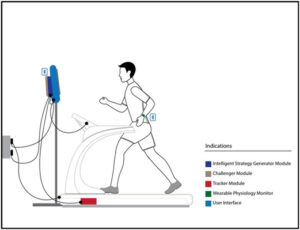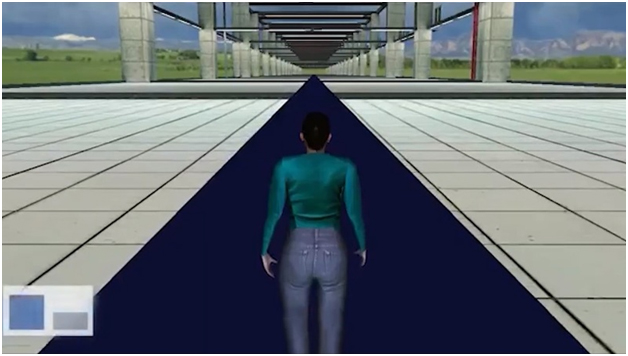- It can prove to be very useful for healthy gym/treadmill users as well as patients suffering from gait disorders
- The research team has also filed an Indian patent for the invention
NE EDUCATION BUREAU
GANDHINAGAR, NOV 30
The Indian Institute of Technology Gandhinagar (IITGN) announced that its researchers have invented a cardiac-sensitive AI-enabled VR-based treadmill exercise platform preventing risk of over-exercising.
 The modern and fast life of the 21st century has its own share of boons and banes. Regular exercise is one of the ways to lead a healthy life in this fast-moving world, but seldom people know their exercising capacity and end up over-exercising. Sometimes this may also result in fatal accidents due to cardiac overload in the healthy gym users and individuals with gait disorders (who suffer from excess energy expenditure during walking). Given the spectrum nature of one’s exercising capacity, individualised exercise intensity becomes very important to ensure: 1) Adequate exercise outcomes and (2) Reduce possibilities of any fatal accident. Generally, decisions regarding the level of exercises are taken by trainers or clinicians who closely monitor an individual’s cardiac and physical capacities and regulate the exercise protocols. However, continuous monitoring and presence of a trainer or clinician during such gait exercise sessions might become a challenge with limited healthcare resources.
The modern and fast life of the 21st century has its own share of boons and banes. Regular exercise is one of the ways to lead a healthy life in this fast-moving world, but seldom people know their exercising capacity and end up over-exercising. Sometimes this may also result in fatal accidents due to cardiac overload in the healthy gym users and individuals with gait disorders (who suffer from excess energy expenditure during walking). Given the spectrum nature of one’s exercising capacity, individualised exercise intensity becomes very important to ensure: 1) Adequate exercise outcomes and (2) Reduce possibilities of any fatal accident. Generally, decisions regarding the level of exercises are taken by trainers or clinicians who closely monitor an individual’s cardiac and physical capacities and regulate the exercise protocols. However, continuous monitoring and presence of a trainer or clinician during such gait exercise sessions might become a challenge with limited healthcare resources.

To address this multi-pronged and often neglected health concern, a team of researchers at the Indian Institute of Technology Gandhinagar (IITGN), led by Prof Uttama Lahiri, Professor of Electrical Engineering, has invented a virtual reality (VR) based treadmill exercise platform – ‘PTreadX’ – that offers personalised, adaptive, and progressive treadmill exercise, such that the user is neither under-challenged (limiting the outcome of exercise) nor over-challenged (causing undue stress or harm). This invention was part of the PhD research by Dr Dhaval Solanki, a PhD alumnus of IITGN, who was joined by Prof Manasi Kanetkar, Assistant Teaching Professor, Design and Innovation Center; Niravkumar Patel, Industrial Designer; and Anand Chauhan, Junior Research Fellow, IITGN.
How the invention works and its benefits
The VR-based immersive task modules in ‘PTreadX’ are integrated with treadmill-based exercises to help monitor one’s cardiac load in real-time and set exercise parameters to improve cardiac endurance without causing any undue stress or harm to the user. It works as a physiology-sensitive system whose functioning or behaviour is dependent on the physiological parameters and comfort level of the user. The entire system senses the physiological behaviour of the user and autonomously decides the challenge level of the exercise to be performed by the user. The challenge level can be of various forms, such as changing of treadmill speed, elevation, etc.
The VR-based task module in this system offers various simulated scenes/ environments and displays a human avatar walking or running along a path at a speed equivalent to the speed of the user walking/running on a treadmill. It also shows other information such as treadmill speed, energy consumption, heart rate, etc. along with audio-visual feedback based on the user’s performance on the treadmill.
The successful trials of the invented technology have shown that real-time, individualised, and progressive gait monitoring and quantification of treadmill exercise resulted in improved cardiac endurance, gait capabilities, walking speed and dynamic balance of individuals doing exercise using PTreadX platform. This platform helps a person follow a moderated exercise regime according to the limits of his/her body thereby reducing the risk of injuries or fatalities due to over-exercising.
Talking about the usefulness of this innovation, Prof Uttama Lahiri, Professor, Electrical Engineering, said, “‘PTreadX’ can prove to be very useful for health-conscious gym/treadmill users and also for individuals with gait disorders. We aim to bring positive change in the lives of health-conscious exercise enthusiasts as well as patients requiring gait rehabilitation.”
The research team has also filed an Indian patent for this innovation and its method. Moreover, the results of this research invention have been published in two international peer-reviewed journals.









